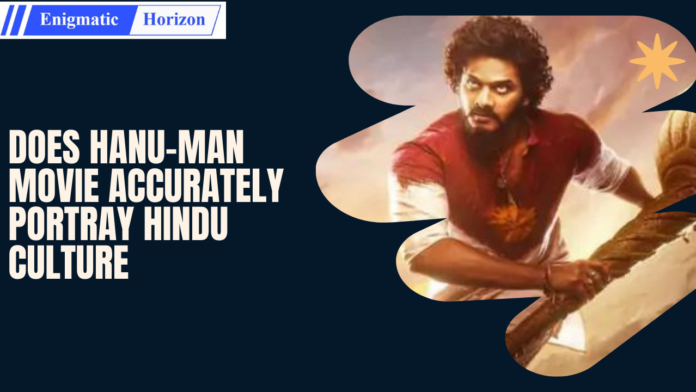Nupur Jha
Director Prasanth Varma’s Hanu-Man is receiving widespread fame and love for all the right reasons. It’s a delightful surprise, seamlessly blending superhero action with themes of Hinduism and Indian culture.
Especially when Bollywood was coming up with unlikable movies like Adipurush, Telugu cinema was making waves with its distinct narratives and meaningful messages. Hanu-Man is gaining recognition as a must-watch and may earn a spot among the best Telugu films of 2024.
However, let’s be honest – Director Prasanth’s superhero flick has its highs and lows, especially when it comes to the backbone of the story – the mythology and depiction of Hindu culture.
So, how accurately does Hanu-Man portray Hinduism? Let’s take a closer look.
Note: Major spoiler ahead. Please continue to read if you have already watched the movie.
Origin of Power in Hanu-Man
Hanu-Man blends Indian mythology with sci-fi to create a superhero story inspired by Lord Hanuman and his strength.
The movie starts with a scene from the Ramayana where a young Hanuman mistakes the sun for a fruit and leaps to grab it. This catches Lord Indra’s attention, who throws his weapon, Vajra, at Hanuman. The impact causes a drop of blood which turns into a gem when it falls into the ocean.

Hanumanthu, later in the story, finds this gem and gains superpowers like strength, healing, and speed.
But it’s important to note that the idea of a gem containing divine blood and giving power to a regular person isn’t from Hinduism. It’s more like the Holy Grail from Arthurian mythology.
In Hindu culture, divine power comes from devotion, righteous living, self-discipline, and following rules. Practices like Bhakti Yoga, Karma Yoga, and Tapasaya help people gain strength and blessings, unlike what we see in Hanu-Man.
Challenging Traditions and Culture In Hanu-Man
There is this whole thing about city folk criticizing rural traditions, and Dr. Meenakshi is at the center of it. She questions these customs like ‘Poylgar’ and ‘Kusthi,’ pointing out how Gajapathi twisted them for oppression instead of protecting the village. But the movie keeps painting these traditions as automatically evil, which honestly feels overdone and kind of cliché. It’s like Bollywood’s usual thing of making Hindu customs the bad guy, and it gets a bit tiring to see that happening again.
Dr. Meenakshi’s bias against village traditions is pretty obvious. She blames everything on them without giving the same scrutiny to city ways. For example, when Michael, a rich guy from the city, shows up, she doesn’t question him or his motives.
However, the movie did explain that both tradition and technology can be villains, depending on who’s using them.
So, Hanu-Man touches on some important stuff, but it falls short of really digging into these issues and showing them in a fair light.
Cringe Jokes, Fillers & Lack of Research
Hanu-Man is a decent movie, but it could have been vastly improved if the director had focused on what really mattered instead of filling it with cringe-worthy jokes and unnecessary scenes. While comedy is subjective, the movie did suffer from prolonged subplots that detracted from the main story and hindered its organic flow.
Take Hanumanthu, for instance, a thief who inexplicably gains powers without any effort. There’s no real struggle or learning, unlike in Hinduism, where spiritual power requires dedication and self-restraint. Even Asuras had to do tapasya for years to gain the powers that they had. Hanumanthu’s character growth is minimal, overshadowed by frivolous pursuits like chasing a girl.
Similarly, Michael, the power-hungry villain, starts off with a compelling origin story but fizzles out due to wasted time on a shallow romance subplot. His character arc feels like a missed opportunity, falling into the trap of clichés seen in many South Indian movies.

Even Vibishishana, who was meant to be a wise sage guiding Hanumanthu, falls short, reduced to a mere “cool” factor rather than a meaningful mentor like Master Shifu from Kung Fu Panda.
The story could have delved deeper into Hanumanthu’s struggles and training to wield his powers effectively, building up to a more impactful climax. Instead, the ending feels rushed and unsatisfying, leaving questions unanswered about Hanumanthu’s selection and motivation.
Despite these flaws, Hanu-Man has its enjoyable moments. However, it could have been a standout film with a clearer direction and a deeper exploration of Hindu cultural themes.
Wrapping up, if you love superhero films, Hanu-Man is worth a one-time watch, despite its flaws. Director Prasanth Varma has truly surpassed expectations, considering the limitations of resources and budget. If you’re craving some cool superhero action and want to move on from disappointments like Adipurush, this movie is far better.
From the gripping background scores to the captivating climax, Prasanth doesn’t hold back on anything. The creation of Ajanadri, the fictional village, is particularly impressive, with attention to detail evident in every aspect, including a magnificent statue of Lord Hanuman guarding the entrance.
Audiences are eagerly awaiting the sequel, Jai Hanuman, especially after Prasanth has set the bar high with the thrilling climax of Hanu-Man! Let’s hope the sequel doesn’t make the same mistakes!
